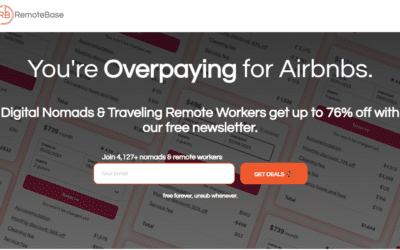|
|
If you are interested in becoming a digital nomad or you are in the digital nomad space, most of the content that you come across is focused on the benefits and advantages of the digital nomad lifestyle. And there are many. You can explore the world now, unleash your creativity, and make the most of your time, it’s truly a life characterized by freedom.
But it would be wrong to always consider the digital nomad lifestyle through rose-colored glasses. It is also a very challenging way to live your life. Routine tasks can become grand missions, you sacrifice societal safety nets, and you are actively choosing a more isolated existence. Learning how to thrive as a digital nomad requires a steep learning curve.
Today, I want to have an honest conversation about some of the biggest challenges of the digital nomad lifestyle. Depending on who you are and what matters to you, these may be reasons to question whether the digital nomad lifestyle is right for you. Even if you decide it is, these are things to prepare for to ensure you make a success of the adventure ahead of you.

Life logistics
The truth is that most of the systems that we rely on to live our lives are designed for people who more or less stay put, or at least have a base of operations. We have legal rights based on where we live, we pay taxes where we live, and we gain access to essential services such as healthcare and social security based on where we live.
When digital nomads choose to live outside these established systems, life becomes more challenging.
Visa applications
This all starts with visa applications, which give you permission to spend time in different countries around the world. If you are someone who lives on the move, applying for the next visa application is something that you are always doing. And if you are unexpectedly denied a visa application along the route, you can find yourself with nowhere to go as you can’t stay where you are because your visa has expired, and you can’t move on.
Managing the applications themselves can also be challenging. Often, countries require that you prove that you have the right to live in the country from where you are applying. This isn’t easy if you are only on a temporary tourist visa wherever you are. Many countries also require that you show that you have a clean criminal record for the countries that you have been living in for the past three to five years. How many countries is that?

Accessing essential services
Even if you have a powerful passport that allows you to travel to most countries visa-free, when you get there, accessing the goods and services that you need can be a challenge.
Often, as a traveler, you aren’t covered by local medical services. At the very least, you need expensive international health insurance to cover the expenses. But even finding good doctors who can see you can be a challenge. Many digital nomads ignore health concerns because of the difficulties associated with obtaining medical care.
Read our guide to health insurance for digital nomads here.
Some countries, such as Brazil and Portugal, give everybody an individual tax number which is needed for pretty much all financial transactions and many other things. It is definitely essential for big things such as opening a bank account or getting a cellphone contract. But it can also be necessary for fairly innocuous things, such as all online purchases.
These are just big examples. Digital nomads often find that accessing things that they take for granted becomes a major challenge.
Money matters
Everyone, digital nomad or not, worries about how secure their income is. You might have a very secure income if you have a remote working contract with a big company, or you might be a freelancer who worries about having enough clients each month. Leaving this question aside, digital nomads have many other money matters to consider.

Cost of living
Advocates of the digital nomad lifestyle often talk about how you can have a better quality of life because you can live in countries with a more affordable cost of living. This is certainly true. If you are earning US dollars but living in Thailand, you can afford a better quality of life.
But living as a digital nomad is expensive. And it is important to remember that because you are mobile, it is not the same as living like an expat.
Are you staying in one place for three months or less? Short-term rentals are expensive. Airbnb homes are often considered a more affordable alternative to hotels, but they can be a lot more expensive than the local rental market.
A recent study compared what landlords could charge for an Airbnb for a month against what they would make if they were renting on the local market. In big European cities like London and Amsterdam, you can be paying five to ten times as much more for an Airbnb than the local market.
Even in more affordable cities, you are paying a premium. In Bogota, Columbia, while you might pay $290 for a one-bedroom apartment on the local market, you can get an Airbnb for around $380 per month. In Tallinn, Estonia, locals might pay around $500 per month to rent a one-bedroom place, while the same accommodation will cost $725 per month on Airbnb. In San Jose, Costa Rica, you might pay $725 on Airbnb for what locals will pay around $400 for on the local rental market.
Those bigger margins already mean that you aren’t benefiting from the lower cost of living. Add to this the fact that as a digital nomad, you are more likely to eat out, as you want the social experience and to try local foods. You are more likely to take taxis and Uber, as you don’t know the local area and may not feel safe on public transport.
As a traveler, at least initially you are probably paying a premium price for local goods and services, significantly diminishing the cost-of-living advantage.
Paying taxes
Rest assured that everyone is required to pay taxes somewhere! As a digital nomad, this can depend on where you are a citizen and where the company that pays you is employing you. This is often the same place, and that country will probably consider you a tax resident. Depending on the country, you might need to pay tax on just the income you earn in that country, or you may need to pay tax on your full international income.
If you then live in another country for more than 183 days, you become a resident there for tax purposes. This means that you should pay your taxes there on your full international income. Fortunately, many countries have double taxation treaties, which means that you only have to pay in one country. However, not all countries have these agreements.
It is fair to say that the more your taxes become, and you may well need the (often expensive) assistance of a tax professional.
While there are digital nomads that manage to fly under the radar and not pay taxes anywhere, there are an equal number that get caught out and find themselves facing crippling bills for back taxes.
Read our guide to international taxes for digital nomads here.
Social security
The other big financial concern for many digital nomads is the lack of a financial safety net. If you are employed in your home country, you probably are paying into the equivalent of social security there. However, if you lose your job, you are very unlikely to be able to claim unemployment or job seeker payments while you are overseas.
If you aren’t traditionally employed, you may not be paying into traditional social security or retirement funds. So, if you lose your job while moving around as a digital nomad, you don’t have recourse to support funds back home, and you don’t have recourse to support funds where you are. You are more or less on your own.
Many digital nomads need to make their own plans when it comes to emergency funds and saving for retirement. Not only does this take a big bite out of your earnings, but it can be time-consuming and expensive.
Lifestyle and Isolation
Most people choose to become digital nomads because they are looking for a better lifestyle. They don’t want to waste time commuting into the office. They don’t want to be forced to live in an expensive city before they work. And they don’t want to have to wait until they retire to start seeing the world and making the most of their lives.
These are all very good reasons to consider becoming a digital nomad. But it is important to remember that nothing is ever all good. The good always comes with the bad.
Isolation
The biggest challenge for most digital nomads is that they feel isolated. They take themselves away from their family and friends and out of situations where they have casual interactions with the familiar. They place themselves in situations where they are far removed from their nearest and dearest, often not just by distance but also by time zone.
This usually isn’t a problem at first but can quickly become challenging. Relationships can become strained by a lack of contact, and also by the fact that you are having very different experiences and are losing common ground.
In addition to this, life goes on when you aren’t there. Friends get married, have children, and continue building their lives. With every passing day, the absent person can become less and less part of the fabric of that life, diminishing closeness. This is one of the main reasons why moving from a normal romantic relationship to a long-distance one can be challenging.
While all of this is going on, digital nomads often find themselves in places where it is hard to make new connections. This is partly because they don’t always spend enough time in one place to form deep connections, and partly because language and cultural barriers can make it hard to form new relationships.
The result is that isolation is often the biggest challenge cited by digital nomads.

Work-life balance
While ideally the digital nomad lifestyle is supposed to help promote a better work-life balance, the reality can look very different.
When you are traveling the world there is so much to see and do. For all but the most disciplined, this often leads to the kind of burning the candle at both ends which results in high stress and burnout.
There are also digital nomads who don’t get to enjoy the full benefits of where they are because they struggle to switch off from work. When your home and the office are one and the same and you don’t have set work hours, any spare moment that you aren’t working can feel wasted. This eats time and again leads to burnout.
The truth is that digital nomads need to be incredibly disciplined to maintain a healthy work-life balance.
The truth about becoming a digital nomad
The truth is that society today isn’t (yet) designed to support digital nomads. Perhaps that will change as the remote work revolution continues to gain momentum. But for millennia, life has been designed around people living more or less consistently in specific communities. When you take yourself out of those communities, life becomes more challenging.
This is part of the attraction of the digital nomad lifestyle for many. You can prove to yourself what you are capable of and discover who you truly are outside of the network that you have always relied on. While this can be a profound experience, it is also one that you should be prepared for before jumping in.
Do you feel you have a better picture now about the pros and cons of digital nomadism? Let us know what resonated with you.









